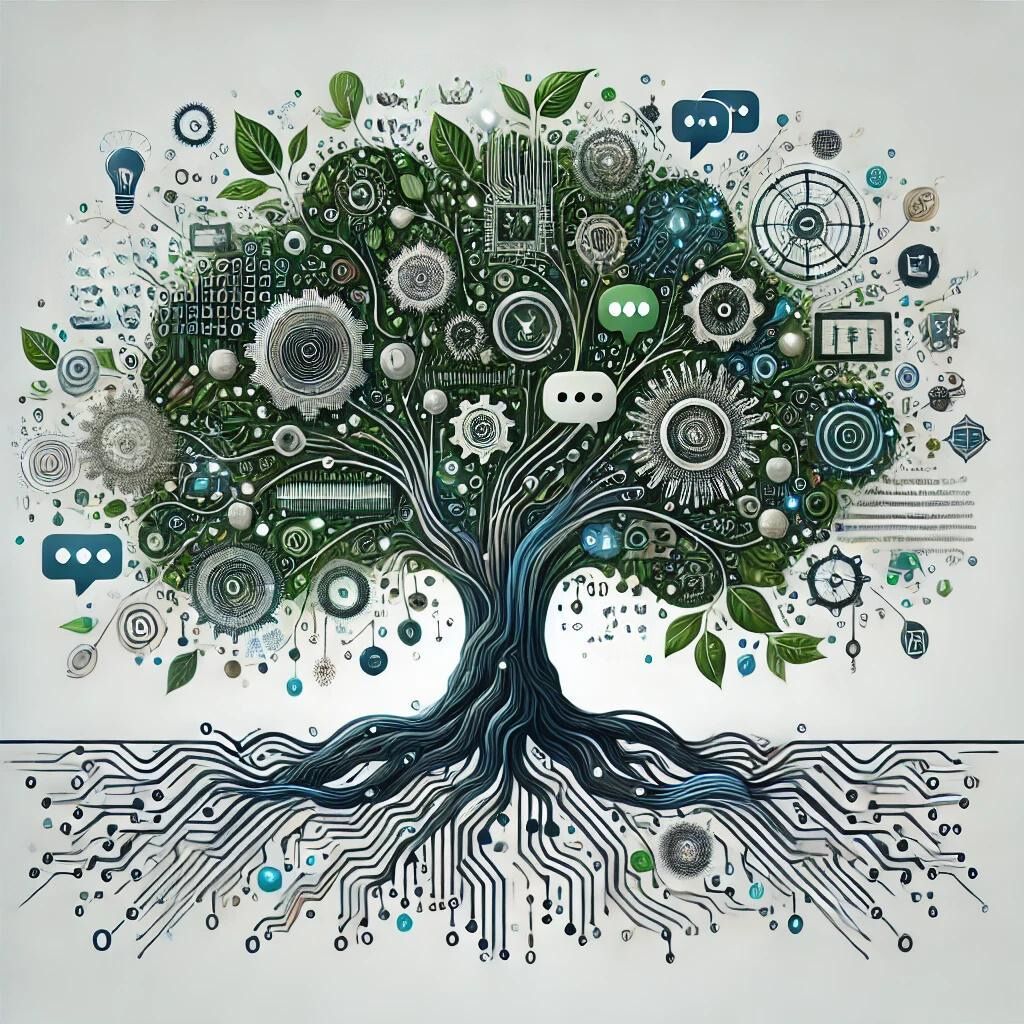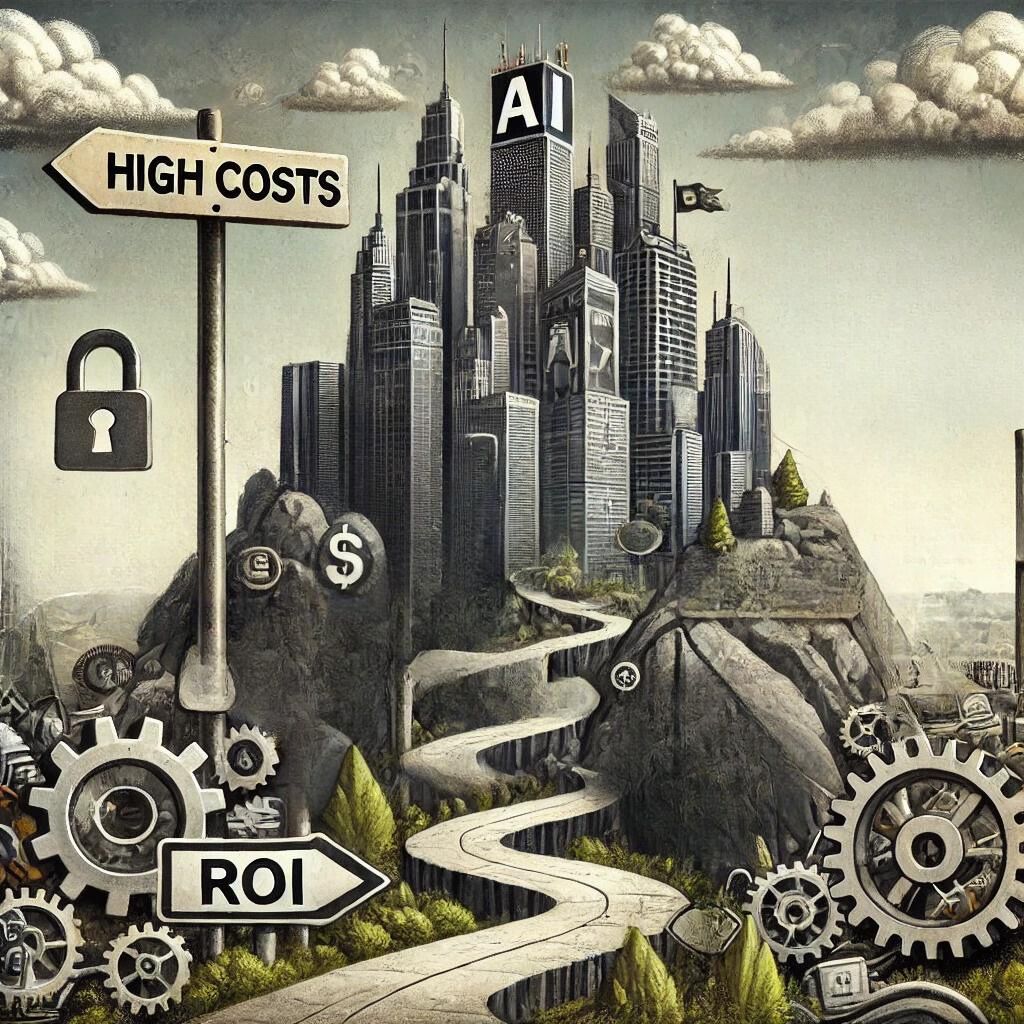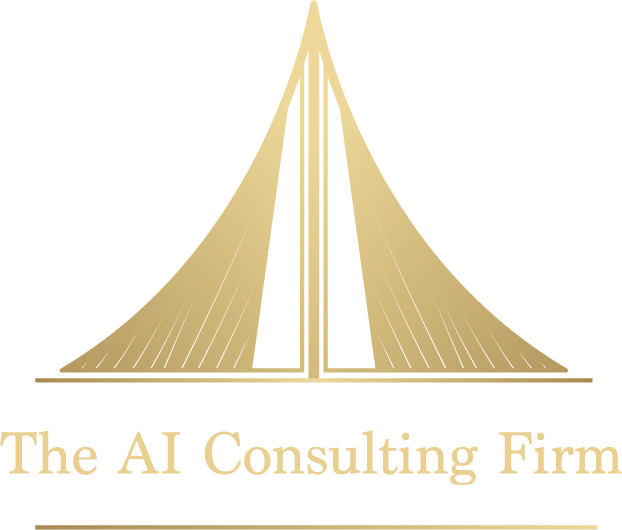AI-Enhanced Knowledge Management: Navigating Data Overload with Advanced Techniques
Harnessing AI to Transform Data into Actionable Knowledge
Knowledge management is taking center stage as businesses strive to stay competitive in today’s ever-evolving market. With an influx of data from every corner, managing that information effectively is a critical challenge. This is where
Artificial Intelligence (AI) steps in, transforming how organizations collect, store, and utilize their
enterprise knowledge.
In 2024, AI has become more than just a tool—it’s a strategic asset. Advanced AI technologies, including
natural language processing (NLP),
machine learning (ML), and
semantic search, are now integral to how organizations handle their data. These technologies not only reduce information overload but also make knowledge sharing more proactive and seamless. From retaining critical knowledge to automating knowledge discovery, AI is redefining how we manage information in our workspaces.
What's especially promising is the use of
Retrieval-Augmented Generation (RAG). RAG integrates retrieval-based and generative models to provide the most contextually relevant outputs. By incorporating
semantic and
hybrid techniques, RAG delves deeper into the meaning behind queries, enhancing the accuracy and context of the information retrieved.
As businesses continue to adapt, AI's role in knowledge management becomes even more pivotal. This post will explore how AI technologies are transforming knowledge management, the latest techniques making waves in AI-enhanced knowledge management, and the challenges that lie ahead. Let's dive into the specifics and see why AI-enhanced knowledge management is crucial for navigating today's data-driven world.

Defining AI Knowledge Management
AI Knowledge Management is more than a buzzword—it’s a transformative strategy for how organizations manage their data and collective intelligence. At its core,
AI Knowledge Management
leverages advanced technologies like
natural language processing (NLP),
machine learning (ML), and
data analytics to optimize the entire
knowledge lifecycle. This includes acquiring, organizing, sharing, and applying knowledge to enhance decision-making and drive innovation.
Traditionally,
knowledge management has struggled with the sheer volume and variety of data. Organizations collect information from multiple sources, including emails, documents, databases, and more, making manual management nearly impossible. This is where
AI steps in, automating these labor-intensive tasks and significantly improving
knowledge accessibility. By deploying AI algorithms, companies can sift through vast datasets, identify trends, and turn raw data into
actionable insights tailored to both individual and organizational needs.
AI Knowledge Management systems go beyond handling structured data—they also capture and analyze
tacit knowledge, which includes valuable insights and expertise typically not documented, such as the wisdom from seasoned employees. AI-driven tools, like
chatbots and
virtual assistants, facilitate the exchange of this tacit knowledge by actively engaging users, asking pertinent questions, and learning from interactions over time.
Technologies like
Retrieval-Augmented Generation (RAG) and
semantic search are central to this process. RAG integrates retrieval-based methods with generative models, allowing AI to access external knowledge sources for contextually relevant responses. By combining
semantic and
hybrid techniques, RAG surpasses simple keyword matching, understanding the intent behind queries to retrieve information that aligns with what the user seeks. This proactive approach makes
knowledge management systems more effective, delivering accurate and meaningful content.
In essence,
AI Knowledge Management creates a dynamic
knowledge ecosystem that empowers organizations to make faster, more informed decisions. It fosters a culture of continuous learning and ensures knowledge is captured, shared, and accessible, effectively breaking down traditional information.

Cutting-Edge Techniques in AI Knowledge Management
AI-Powered Chatbots
AI-powered chatbots are revolutionizing
knowledge management by serving as 24/7 digital colleagues that provide instant responses to queries. These chatbots use advanced
natural language processing (NLP) techniques to interpret questions and deliver contextually relevant answers. They go beyond simple keyword-based responses; AI chatbots can understand intent and provide more nuanced guidance.
An effective
AI chatbot employs
Retrieval-Augmented Generation (RAG) to enhance its responses. By tapping into external data sources or knowledge bases, RAG ensures the chatbot references the most current and accurate information without requiring constant retraining of the language model. For example, the chatbot can access a company’s product catalog, internal documents, or industry guidelines to generate informed, personalized responses. This is particularly useful in sectors like
customer service and
HR, where up-to-date, tailored information is crucial Amazon Web Services, Inc.
RAG (Retrieval-Augmented Generation) and Semantic Search
RAG is central to the effectiveness of AI-enhanced knowledge management. It integrates retrieval-based methods with generative models, allowing the system to combine the capabilities of large language models (LLMs) with external knowledge sources. Unlike traditional keyword matching, RAG incorporates semantic search techniques that delve deeper into the intent behind user queries. This allows AI to understand the meaning of the question, retrieving information that aligns with what the user truly seeks IBM Research.
Hybrid techniques further enhance RAG's capabilities by blending keyword-based search with semantic understanding. This combination results in more precise information retrieval, transforming the knowledge management system from reactive to proactive. It’s not just about storing data—it’s about ensuring the right information reaches the right person at the right time.
Knowledge Graphs for Complex Data
When managing vast and complex datasets,
knowledge graphs have become invaluable tools. They organize information by highlighting relationships between data points, facilitating more nuanced searches. For example, a knowledge graph can link products, research papers, and customer inquiries, enabling the AI to understand context and relationships within the data. When integrated with
AI-enhanced knowledge management, these graphs provide a more structured and interconnected approach to data retrieval, helping users uncover hidden insights and trends.
Advanced Natural Language Processing (NLP) Techniques
Modern AI Knowledge Management systems utilize advanced NLP techniques, such as sentiment analysis, topic modeling, and named entity recognition, to extract valuable insights from unstructured data. These techniques empower AI to identify patterns, categorize information, and even detect the nuances of human language. As a result, companies can gain a clearer understanding of internal communications, customer feedback, and market trends, fostering more informed decision-making.
Together, these cutting-edge techniques are reshaping how organizations interact with their knowledge bases. AI-powered chatbots and RAG make information more accessible and accurate, while knowledge graphs and advanced NLP enable a deeper understanding of complex data. In the following sections, we’ll explore specific case studies that showcase the real-world application of these technologies.

Challenges in AI-Driven Knowledge Management
1. Data Privacy and Security
Data privacy and
security are major concerns for business owners when it comes to
AI-enhanced knowledge management. AI systems handle sensitive information such as customer data, employee records, and intellectual property. Ensuring compliance with data protection regulations like
GDPR and maintaining strong encryption and access control measures is a business imperative, not just a technical hurdle. Failure to secure this data can lead to legal issues, loss of customer trust, and significant damage to a company’s reputation.
2. Resistance to Change Among Employees
Implementing
AI-enhanced knowledge management can disrupt established workflows, resulting in
resistance from employees. Workers used to traditional methods might feel threatened by the introduction of AI, fearing job displacement or loss of control over their work. Business owners need to effectively manage this transition by providing adequate training and communicating how AI is meant to augment human capabilities rather than replace them. Building an internal culture that embraces AI as a supportive tool is crucial for successful adoption.
3. Managing Expectations for AI Capabilities
While
AI-enhanced knowledge management systems are powerful, they are not magic solutions. Business owners must set realistic expectations about what AI can and cannot do. AI can automate data processing and generate actionable insights, but it requires quality input and regular oversight to function effectively. Overestimating AI's capabilities can lead to frustration, especially if immediate, flawless results are expected. A balanced approach that acknowledges AI’s strengths and limitations will help in successfully integrating these systems.
4. Continuous Maintenance and Updating
Unlike static systems,
AI-enhanced knowledge management solutions require continuous maintenance. Business owners need to plan for regular updates to
AI models, particularly as new data is introduced or as company policies and industry regulations evolve. This ongoing upkeep can be an operational challenge, demanding dedicated resources and technical expertise to ensure the AI continues to perform optimally.
5. Customization and Scalability
Off-the-shelf
AI solutions may not fully meet a business’s unique needs. Customizing
AI knowledge management tools to align with specific industry requirements or company workflows can be a complex, time-consuming task. Additionally, as the business grows, scaling AI systems to handle increasing volumes of data and interactions becomes a new challenge. Business owners need to anticipate these scaling issues and prepare their infrastructure to handle the demands of a growing operation.
6. Measuring ROI
One of the most practical challenges for business owners is measuring the return on investment (ROI) of AI-enhanced knowledge management systems. It can be difficult to determine tangible benefits, such as time saved, improved decision-making, or increased customer satisfaction. Without clear metrics, justifying the ongoing costs of maintaining and upgrading AI systems can be a struggle. Establishing key performance indicators (KPIs) early on can help track the system's impact and justify the investment.
Addressing these challenges requires careful planning, a clear AI implementation strategy, and ongoing management. Business owners must approach AI-enhanced knowledge management as a dynamic asset that, while highly beneficial, requires consistent attention and investment to achieve its full potential.
Case Studies
Xplorer: A Versatile Knowledge Management Tool Developed by 38 Labs, Inc.
Developed by
38 Labs, Inc., Xplorer was initially tailored for a client in the Medical & Pharmaceutical industry. However, its powerful and flexible capabilities have since made it a go-to
knowledge management platform for various sectors. Xplorer is capable of hosting hundreds of millions of documents and integrates seamlessly with an organization’s existing libraries, providing instant access to critical information.
The platform’s conversational AI chatbot,
Okus, utilizes advanced technologies like
Retrieval-Augmented Generation (RAG) and
semantic search to allow users to interact with their data in a natural and efficient way. Currently, we are collaborating with a
Defense Contractor to implement Xplorer as their central knowledge management hub, housing an extensive library of global operating procedures and project documents. This setup ensures secure, organized access to vital information, emphasizing Xplorer's adaptability to meet industry-specific requirements. This case illustrates how
38 Labs, Inc. uses AI to enhance
knowledge management and improve operational efficiency across diverse industries.
B & W Distributors: AI-Powered Chatbot Built by The AI Consulting Firm
B & W Distributors, operating in the corrosion prevention and chemical distribution sector, needed an efficient method for managing customer inquiries but lacked an existing knowledge base.
The AI Consulting Firm developed a customized
AI-powered chatbot that now serves as a rudimentary knowledge base, allowing users to obtain instant answers and access reference documents.
This chatbot employs a
hybrid semantic search approach, which makes it highly effective at understanding customer queries and delivering detailed, product-specific responses. By integrating directly with B & W’s product catalog, the chatbot addresses a range of inquiries related to specifications, applications, and compliance guidelines. This solution has significantly improved customer support while also providing valuable insights into customer interactions, aiding B & W in refining their strategies and services over time.
Conclusion
38 Labs, Inc. and The AI Consulting Firm have partnered to assist organizations of all sizes in integrating and adopting AI and ML solutions tailored to their unique needs. Whether transforming research processes with Xplorer or enhancing customer support through a custom chatbot, these solutions demonstrate the power of AI to streamline processes, improve decision-making, and foster a culture of continuous learning.
While there are challenges, such as the need for ongoing maintenance,
AI-enhanced knowledge management is rapidly becoming an essential asset for businesses. By leveraging technologies like
RAG,
semantic search, and
advanced natural language processing,
38 Labs, Inc. and
The AI Consulting Firm are driving change, offering tools that break down information silos and provide organizations with the competitive edge they need to succeed in an increasingly data-driven world.
Ready to take your knowledge management to the next level? Contact 38 Labs, Inc. and The AI Consulting Firm today to discuss how we can tailor AI solutions to meet your business's unique needs and unlock new potential for growth and efficiency.
All Rights Reserved | The AI Consulting Firm | Privacy Policy
